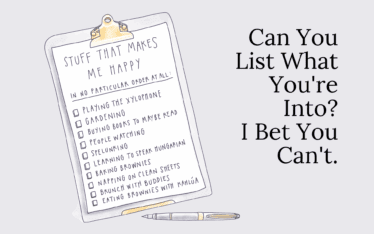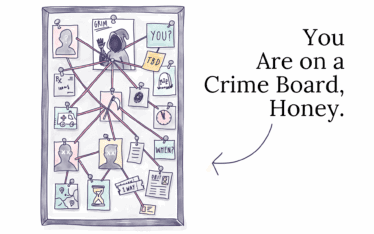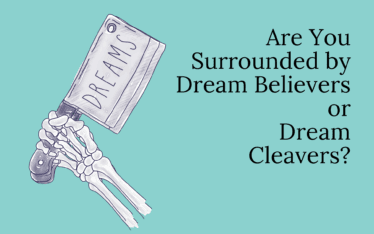“I’d roll over in my grave if people called me a cheapskate,” said the man in the third row.
Bashfully, the man sitting next to him admitted, “I really don’t want to be described as boring.”
“I’d just die if someone called me scatterbrained,” a woman at the back of the room offered … ironically. The exercise was for her to already be dead—eavesdropping at her funeral.
If you were sitting in this recent workshop, and I asked you to imagine being reclined in your casket (don’t worry, you’d feel quite relaxed, what with no pulse and all)—like a fly on the wall, listening in on people’s chitter chatter about you … how would you not want to be described?
Oh, Legacy. That little thing.
Legacy. It’s a heavy word, isn’t it? It begs to be spelled with a capital L even when it’s not grammatically appropriate to do so.
There’s a solemnity to it, this “thinking about our legacy” business—thinking about what we’ll leave behind and how we’ll be remembered and whether we’ve made a dent (or even just a wee nick) in this world. It’s profound and sometimes pressure-ey stuff.
Legacy also carries with it the stench of mortality, because contemplating what values and morals and bank accounts and trinkets we’d like to pass on will never not be linked to us passing on. It’s a subject that’s not for the faint of heart … but your heart’s working just fine over there, so let’s proceed.
We’ve had a conversation before about this lofty topic (in this blog post here), and we had a good time, didn’t we? I got you thinking about how you’d like to be described after you’d gone and bit the biscuit, and you went and jotted down a bunch of swell words that meant a lot to you. Maybe your words sounded like one of these:
- Kind
- Fun-loving
- Generous
- Creative
- Organized
- Leader
- Wicked smart
- Best apple crumble pie maker of all time
 The idea was to get clear on the kind of legacy you wanted to impart, and then start living a life that earned you the right to be described that way after you were dead and gone. Makes sense, for sure. Except maybe it wasn’t super-duper effective. Why? We need the nudge of the negative.
The idea was to get clear on the kind of legacy you wanted to impart, and then start living a life that earned you the right to be described that way after you were dead and gone. Makes sense, for sure. Except maybe it wasn’t super-duper effective. Why? We need the nudge of the negative.
Research highlights that we’re often more motivated to avoid leaving a negative legacy than we are to create a positive one. Humans: we’re a puzzling bunch, aren’t we? I’m not here to debate or dissect how and why this fact is true (oh but I will in a post one day; just you wait). No, I’m suggesting here that we roll with our inherent tendencies and use them to our advantage.
Instead of asking how you want to be remembered, flip the script. Imagine how you’d hate to be described if you were a fly on the wall at your funeral. What descriptions would make you roll over in your casket? What words would you recoil at hearing (if corpses could recoil)? Examples from the workshops I’ve led lately include:
- Unkind
- Selfish
- Superficial
- Braggadocios
- Distant
- Sketchy morals
- Hypervigilant
- Always working
- “Talked a big game”
- Took life for granted
You see where this is going, right?
Take a look at the words you might’ve just jotted down. What’s the opposite of those words? They are likely values that matter to you.
For example, if you’d barf in your corpse mouth abhor being described as a quitter (a real-life example from a woman in a session I led in the spring), it might flag how much you value perseverance/ persistence/ resilience/ risk-taking/ being okay with possible failure/ vulnerability/ focus/ willingness to “give it a go.”
Identifying these values gives you a fighting chance to enhance your behavior. “How do I live a life that reveals I try things, not quit things?” might be a good question to ask, and/or, “What project can I persevere at this week?” “If I’m not a quitter, then how do I have to act today to prove that’s true?”
We get one go at this thing called life, as far as we know. (You Only Die Once!) Let’s be deliberate in any way we can to shape our Mondays and weeks and years to leave legacies that reflect our values … that don’t reflect the ways we’d hate to be described.
I don’t know about you, but I want to have a great time at my funeral, and I want you to love yours, too. If we can hear people talking about us while we’re chock full of embalming fluid, it’ll be all solid gold stuff. Legacy living kind of stuff. We can die happy, knowing we nailed our values.

P.S.: Have you listened to the audio version of my book, You Only Die Once: How to Make It to the End with No Regrets? Ten hours of memento mori deliciousness and me in your ears.
P.P.S.: Let’s do Instagram together?
P.P.P.S.: Oh and just in case you missed it… I’d love you forever if you took 16 minutes out of your life to watch my TEDx talk!






